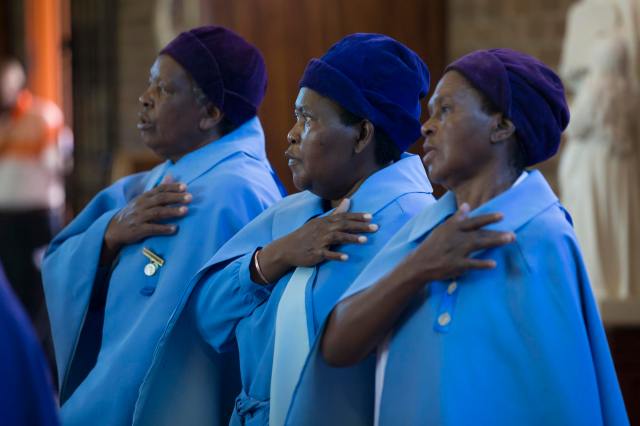Women pray in Regina Mundi Catholic Church – Credit: Oli Scarff/Getty

Structural discrimination is the idea that public and private sector institutions can be considered discriminatory, irrespective of intention, if the negative effects of their actions fall disproportionately on a particular group of people.
For instance, austerity policies that seek to cut public sector payrolls have been condemned as structurally sexist because public sector jobs are disproportionately filled by women. Even if the government concerned doesn’t have a single misogynist in its ranks, the structural effect of its policies is nevertheless sexist.
That’s the theory – but it doesn’t go undisputed. For instance, if cutting those jobs discriminates against women, does that mean that when it was filling those jobs the state was discriminating against men? Moreover, is government to be constrained from following any path of action, however necessary, if the unintended side-effects are uneven?
Though the idea of structural discrimination is more associated with liberal than conservative viewpoints it can be applied in unexpected ways. For instance, in a piece for Bloomberg, Stephen L Carter uses it, in effect, as a lens through which to view liberal hostility toward religion – and Christianity in particular:
“When you mock Christians, you’re not mocking who you think you are.
“A 2015 Pew Research Center study of race and ethnicity among U.S. religions provides some basic facts. In the first place, if you’re mocking Christians, you’re mostly mocking women, because women are more likely than men to be Christians. The greatest disproportion is found among black Christians, of whom only 41 percent are male. So you’re mocking black women in particular.”
Black Americans aren’t just more likely to be Christians than their white compatriots, they’re more likely to be intensely Christian:
“Overall, people of color are more likely than whites to be Christians – and pretty devout Christians at that. Some 83 percent of all black Americans are absolutely certain that God exists. No other group comes close to this figure. Black Christians are far more likely than white Christians (84 percent to 64 percent) to describe religion as very important in their lives. Of all ethnic groups, black Christians are the most likely to attend services, pray frequently and read the Bible regularly… And they are, by large margins, the most likely to believe that the Bible is the literally inerrant word of God. In short, if you find Christian traditionalism creepy, it’s black people you’re talking about.”
Looking beyond America, Carter notes that “around the globe, the people most likely to be Christians are women of color.”
The days when ‘Christendom’ was synonymous with Europe and Europeans are long over. Indeed, where church communities are growing in the West, that is often due to immigration from the rest of the world.
Is any of this an argument for inflating legitimate concerns over structural discrimination into a secular version of the old blasphemy laws? Absolutely not, says Carter:
“I’m a free-speech guy, and I don’t believe any group should be placed beyond criticism or mockery. But if you plan to mock, it’s useful to know whom you’re actually mocking.”
A tad more awareness would be especially welcome from the mockers-in-chief among our privileged cultural elites. Of course, what they’d protest is that their target is the ideology and institutions of organised religion – with the gender and ethnic balance of the religious population being purely incidental.
Well, fair enough – just as long as they’re not applying the idea of structural discrimination only where it suits them.










Join the discussion
Join like minded readers that support our journalism by becoming a paid subscriber
To join the discussion in the comments, become a paid subscriber.
Join like minded readers that support our journalism, read unlimited articles and enjoy other subscriber-only benefits.
Subscribe